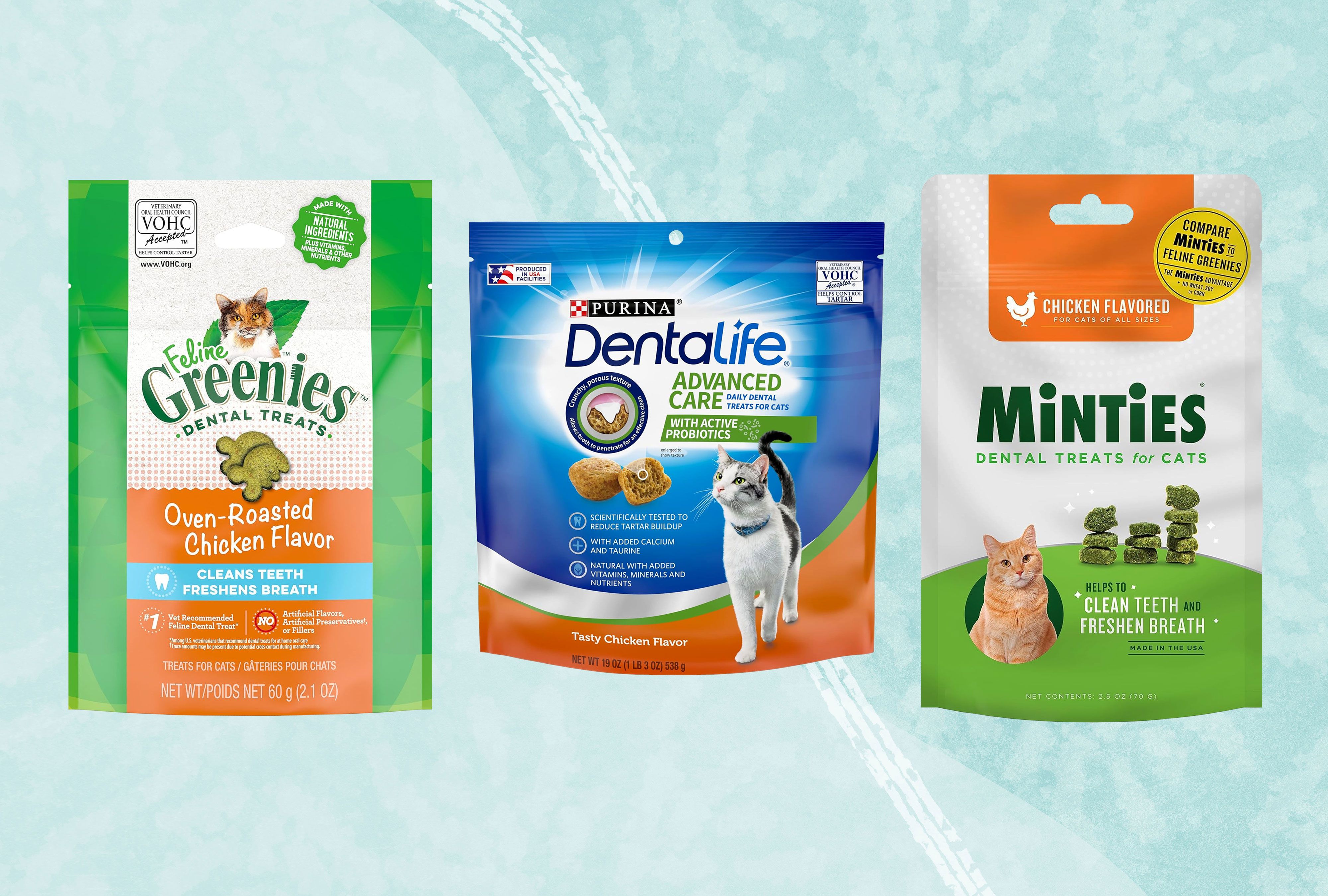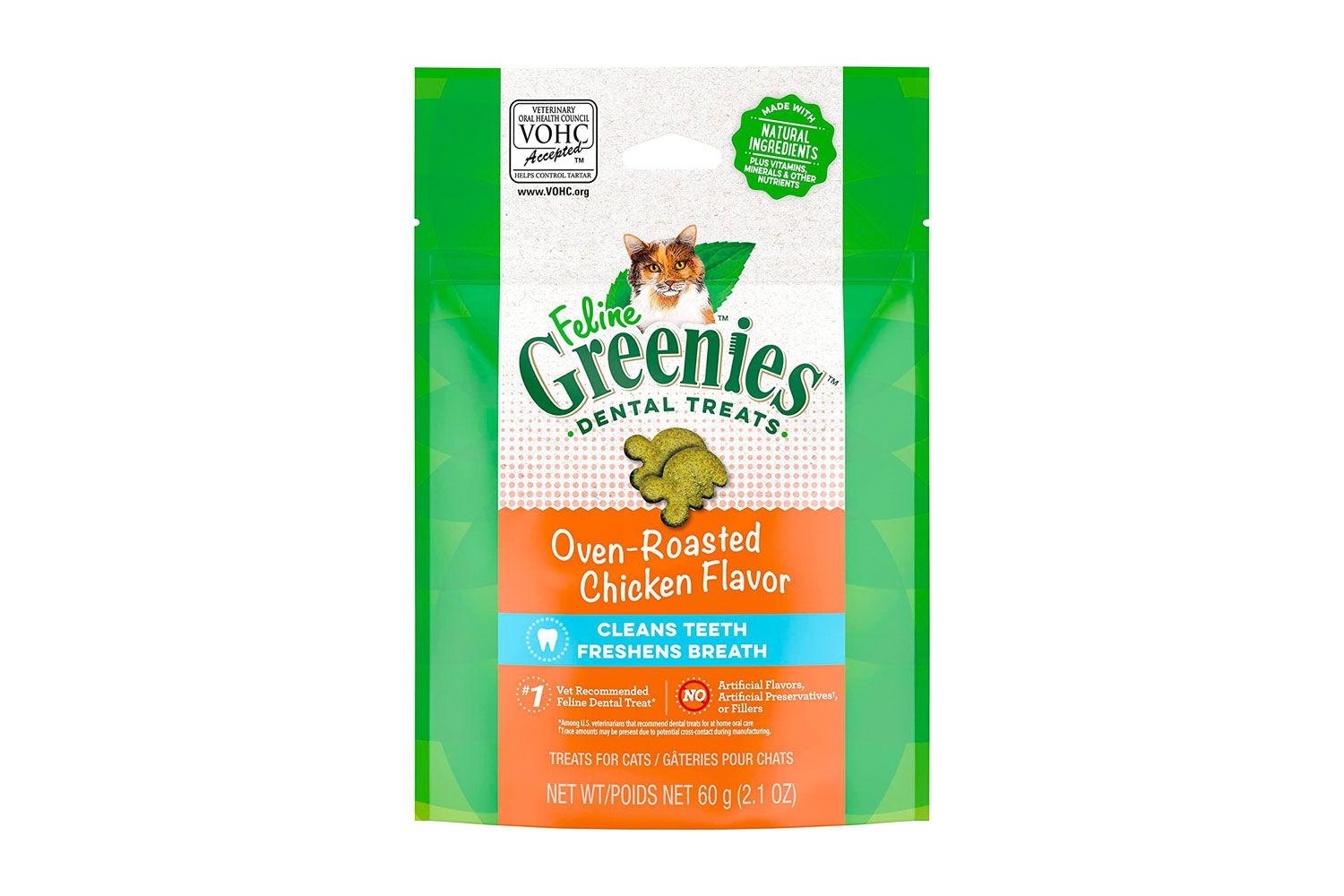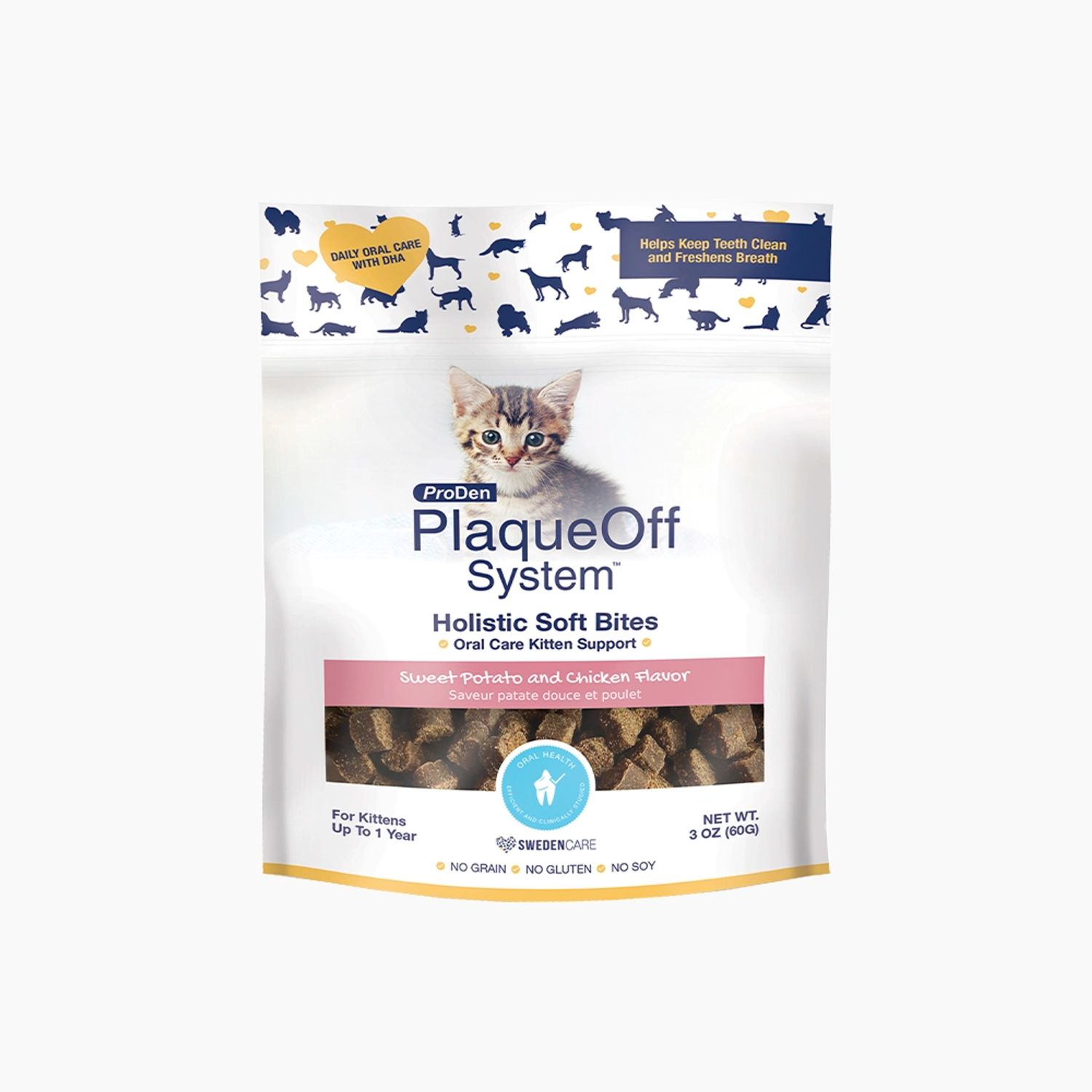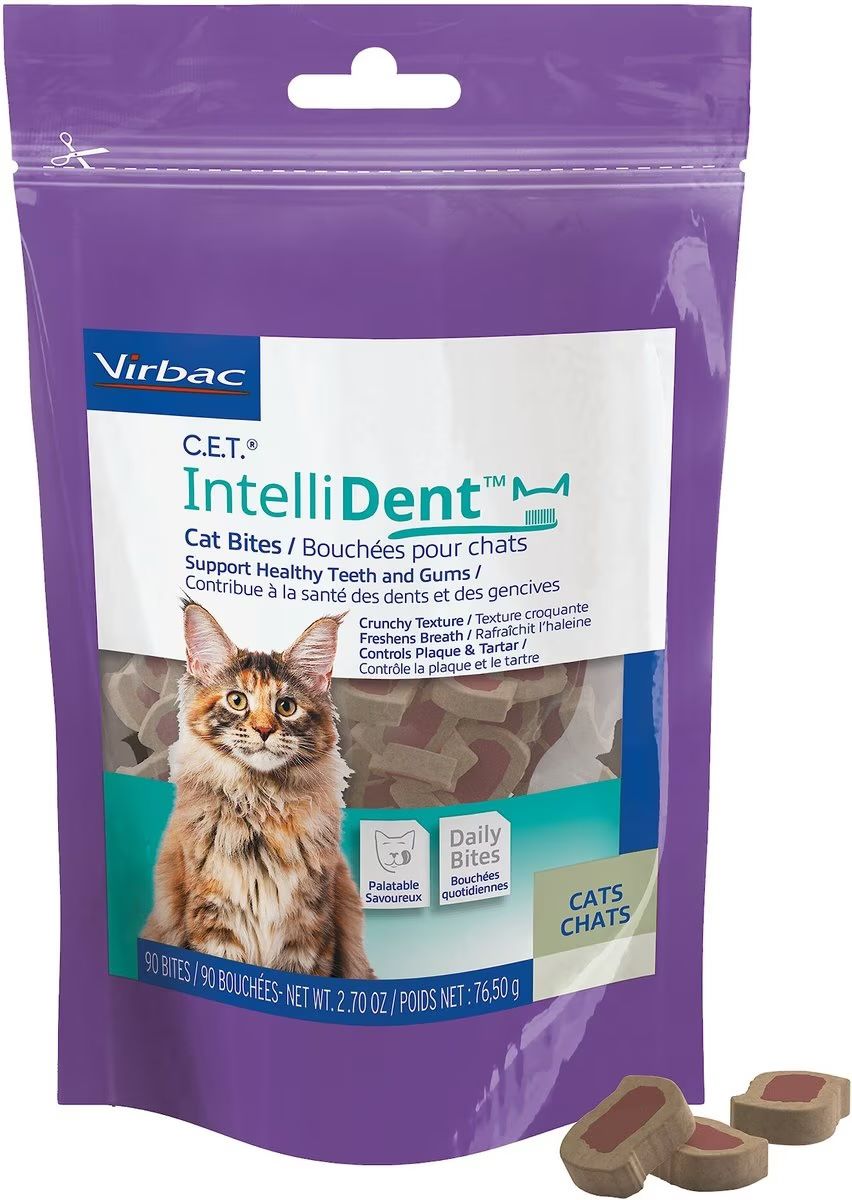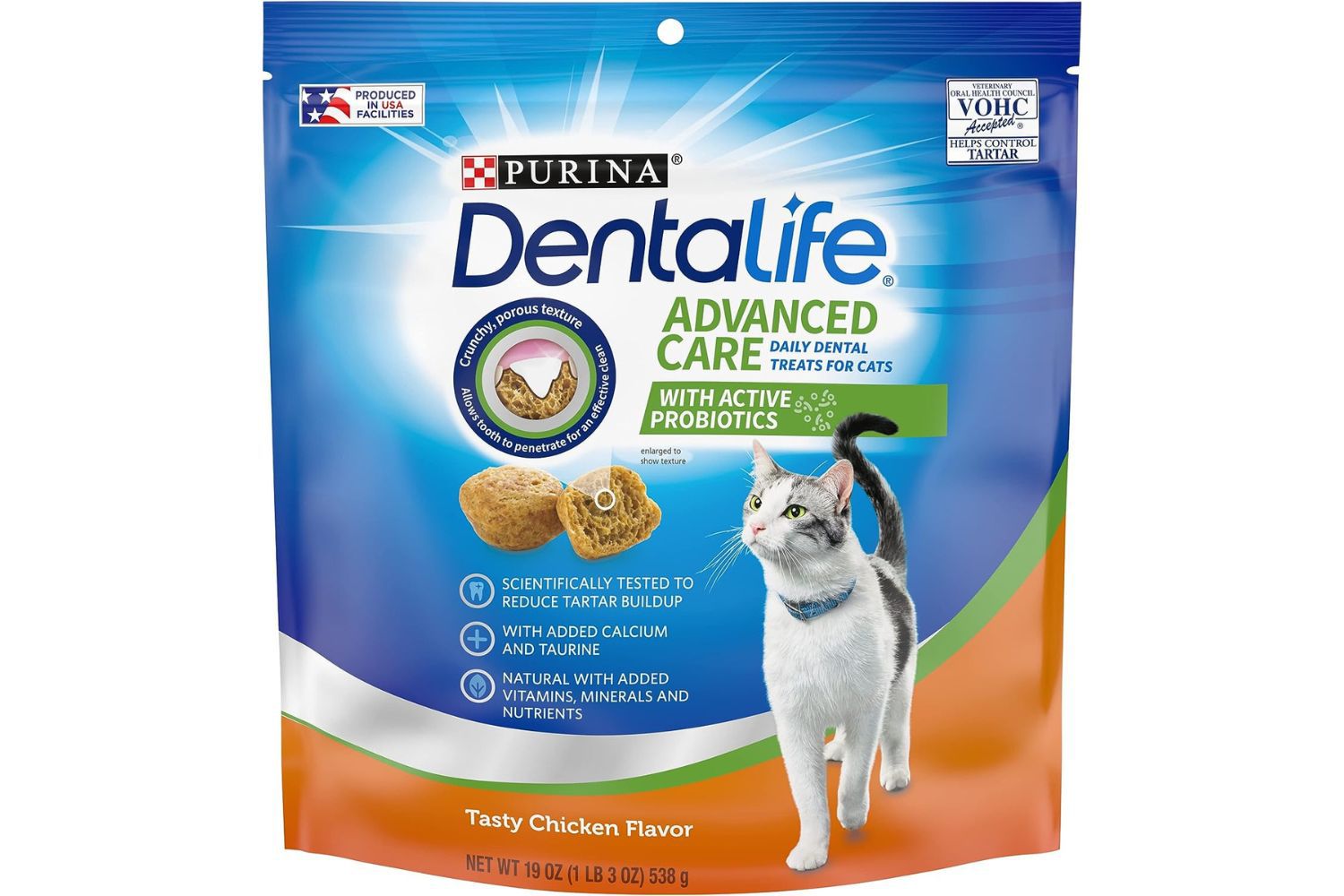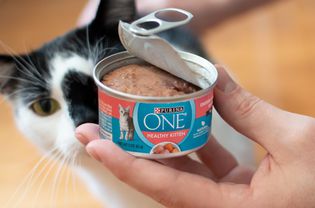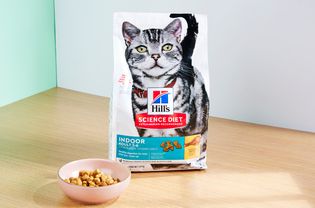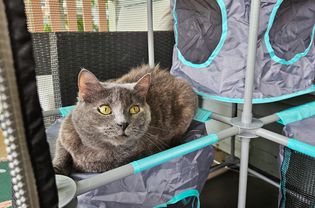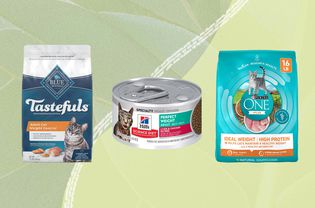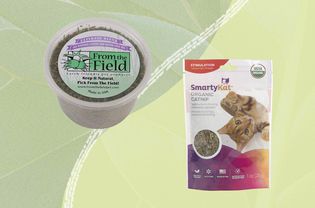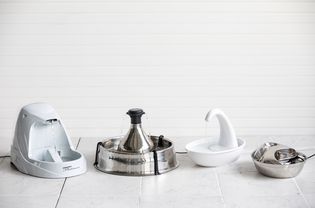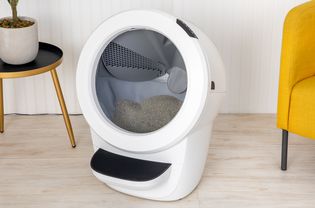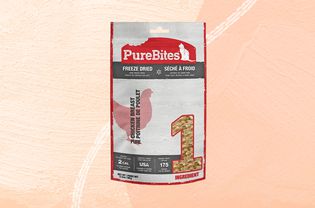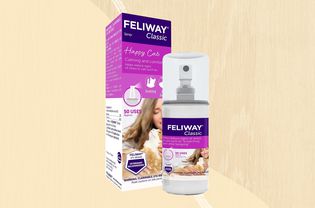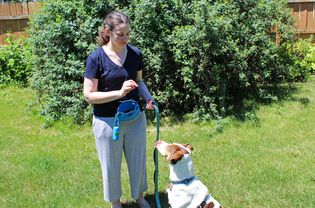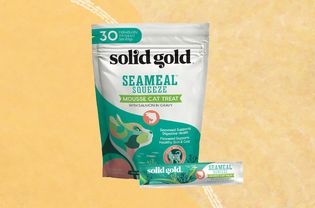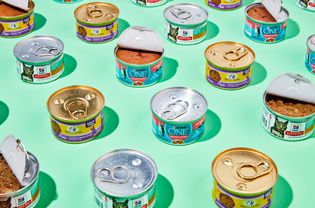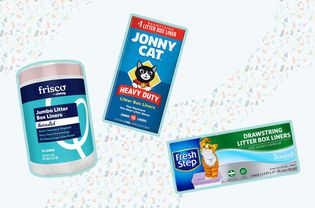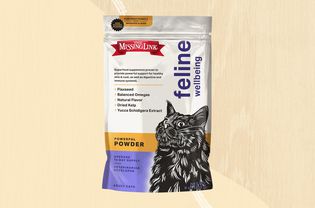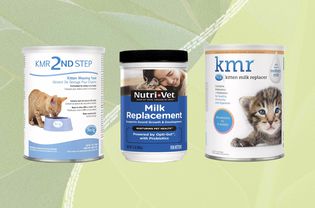Cat dental treats help reduce plaque and tartar accumulation on teeth, and for most cats, a daily dose of dental treats is easier than brushing a cats teeth. According to veterinarian Dr. Katy Felton, DVM, the most successful dental treats have a rough texture which works to "brush" the teeth and sweep the gums as a cat chews. Dr. Felton also recommends starting your cat's dental routine when they are a kitten. "The earlier a cat starts to practice dental home care, both active (brushing) and passive (chewing on a dental cat treats), the better."
The Winners
Our pick for the best dental treat for cats is Greenies Feline Adult Dental Cat Treats. These treats are formulated for cats over the age of one, come in several cat-friendly flavors—like catnip and tuna—and are approved by the Veterinary Oral Health Council (VOHC) for tartar control. If you have kitten, ProDen Plaqueoff System Holistic Soft Bites offer DHA, an essential building block kittens need to consume, and the sweet potato and chicken flavored chews are free of grains, gluten, and soy.
We found a few other cat treats for dental care we think you should check out.
- A Low Calorie Choice: Virbac C.E.T. IntelliDent Cat Bites
- Best For Digestive Support: Purina Dental Life Advanced Care Cat Dental Treats
The Best Dental Treat For Cats
Greenies Feline Dental Cat Treats
Greenies Felines Adult Dental Cat Treats are often the go-to dental treat for cat owners because of their excellent reputation for being well-liked by cats. They also have a minimum makeup of 27 percent protein and 10 percent fiber—higher than most other treats on this list.
We also like that the VOHC approves them, which is proof that they are more than just a favorite among felines—they do what they are designed to do. These cat treats are crunchy with a nicely textured surface that scrapes off tartar to keep your cat’s teeth clean. In fact, Greenies are so well-liked by some kitties that they can be used as training treats, too, giving some owners a bit of extra value. There are five flavors to choose from: tuna, chicken, catnip, shrimp, and salmon.
One drawback to these popular treats is they contain wheat, corn, and oat ingredients (so they are not grain-free). Grains can be hard to digest for some cats, while others may have allergies. You’ll also need to feed your cat quite a few (we doubt they’ll complain). For example, Greenies recommends feeding a 10-pound adult cat eight treats at a time, twice a day. This equates to about 16 percent of the cat’s caloric intake, which is a lot for a treat. That said, Greenies meet the nutritional standards of the AAFCO for adult cat maintenance. These treats should not be given to cats under one year of age.
Less than two calories per treat
Best for Kittens
ProDen PlaqueOff System Holistic Soft Bites Oral Kitten Support
For kittens up to a year of age, ProDen PlaqueOff System Holistic Soft Bites for Kittens are safe for daily use in addition to their regular food. The bites contain sustainably harvested kelp from Scandinavia and are made in the United States. Each soft chew is grain, gluten, and soy-free, and additional ingredients include sweet potatoes, chicken, and flaxseed to supplement your kitten’s regular food with nutrients. The Soft Bites for Kittens have been clinically studied by the manufacturer, ProDen, to prove its efficacy at removing plaque and tartar, but the treats are not currently part of the VOHC's list of approved products for feline dental care.
The first ingredient is kelp powder (listed by its scientific name, ascophyllum nodosum, on the packaging) which is a natural source of DHA, followed by docosahexaenoic acid, which is also DHA. And DHA is an essential omega fatty acid kittens need for brain and vision development.
Natural fish flavor
How We Picked
We consulted with feline experts, including Dr. Felton, DVM, to advise on what is needed to make an effective and safe dental treat for cats. For dental treats to work, they must have a rough texture that encourages a cat to chew in order to “brush” the teeth and sweep the gums as your cat chomps on a flavor they enjoy.
We also referenced the approved list from the Veterinary Oral Health Council (VOHC). This is not a regulartoy agency, but they are an independent organization of veterinary dentists that evaluate dental products for cats and dogs. A product that passes evaluation in accordance with VOHC standards can display the VOHC Seal on packaging. However, the absence of the seal doesn't mean the product isn't approved as not all companies submit their products for review to the VOHC.
Other Cat Dental Treats We Evaluated
Purina’s Pro Plan Veterinary Diets Crunchy Bites: These are the only dental treats for cats with the VOHC seal of approval for plaque and tartar reduction, but they are made with corn as the first ingredient and they are usually more expensive than other treats on our list.
Minities Dental Treats for Cats: These treats are not currently on the VOHC-approved dental cat treats, but they come in two flavors cats we know enjoy, chicken or salmon, and the recipes are free of corn, wheat, and soy.
Emerald Pet Feline Dental Treats: The fish-shaped crunchy dental treats are free of corn, wheat, soy, and dairy, but they are not currently on the VOHC-approved list. We also like that the treats are made in the United States with nationally-sourced ingredients, including chicken and alfalfa.
Ark Naturals Kiss Me-Ow Dental Chews: With a softer texture and a "toothpaste" center, these treats are more gentle yet highly effective. They are made with SHMP (sodium hexametaphosphate), an ingredient that binds to calcium to prevent it from hardening into plaque. They also provide omega 3 and omega 6 fatty acids.
What To Look For
Ingredients
As with cat food, the first few ingredients in a cat dental product make all the difference in its effectiveness and nutrition. Fish like salmon or tuna, providing nourishing omega-3 and omega 6 acids, as well as chicken or turkey, rich in essential vitamins, minerals and protein, are all superb first ingredients. Other ingredients like vegetables, fruit, flaxseed, brown rice, barley, or oats are excellent too, providing quality fiber to assist in reducing and removing tartar, and additional vitamins and minerals, which are all better than seeing a lot of filler-type components. Natural breath fresheners like catnip may be included, as well as ingredients such as probiotics or malic acid to help reduce plaque. It’s also better to see fewer ingredients overall than a long list whenever possible.
Veterinary Oral Health Council (VOHC) Seal of Acceptance
It’s important to understand that the VOHC isn’t a regulatory agency and doesn’t test the products itself.
The VOHC is a group of veterinary dentists that provide consumers and vets with an objective means of recognizing certain pet products that meet standards of effectiveness when it comes to controlling the accumulation of dental plaque and tartar in cats (and dogs). However, their seal of approval only reflects a product’s effectiveness in its purpose of dental hygiene, and it only awards its seal to products that apply for it and have the correct, necessary supporting documents. If a product does not have VOHC approval, it may still be effective as a dental treat, but the manufacturer may not have submitted it to the organization.
Size
The size of your cat’s dental treat should be looked at from two different angles. For starters, make sure to use a dental cat treat that is appropriately sized for your cat’s mouth and chewing abilities. Secondly, it’s important to note that some dental treats are larger than regular cat kibble, which is helpful in preventing cats from gobbling them down without prompting the chewing necessary for scrubbing tartar and plaque from the teeth. While helpful in this regard, they may be much too big to comfortably chew for some cats (especially small kitten mouths).
Caloric Intake
You may have to break out the calculator for this one, but working out how many calories dental treats add to your cat’s overall diet will give you a better sense of appropriate servings. Some treats may be lower in calories than others but require more treats to get the job done. You’ll also want to budget how many servings you can get from each bag, and if a particular type of treat is worth the money for you.
More We Recommend
A Low Calorie Choice: Virbac C.E.T. Intellident Cat Bites provide a weight-friendly solution to feline dental care, requiring only three treats per day, with a total of less than eight calories. Their formula cleans teeth, freshens breath, and offers gum support, combined together to create the company’s “3-in-1 dental support”. The recipe is free of artificial preservatives and features first ingredients of chicken meal and brown rice, with additional components of poultry fat, pomegranate, and salmon oil, making it nutrient-rich and easily digested.
The C.E.T. in the name stands for Clean Every Tooth, and these treats are a top choice among many licensed veterinarians in the United States.The company, Virbac, was founded in 1968 by a French veterinarian, and has grown into an independent pharmaceutical laboratory that devotes itself to animal health. Chewing Virbac’s treats helps cats to ward off periodontal disease, which can take hold early in a feline’s life if not prevented. They’re also ideal for all life stages, with cats of all ages enjoying them—some preferring them over even their regular non-dental treats.
The downside is that some cats might struggle to chew them, as they’re very crunchy (for tartar-removing purposes), and quite hard.
Daily serving is only three treats
Best for Digestive Support: These Purina Dental Life Advanced Care Cat Dental Treats come in salmon or chicken flavors. They are larger than other dental treats, which can make them a boon for cats prone to gobbling down smaller treats. The larger size forces cats to chew, thus ensuring the rough and porous texture of the treats move up and down the teeth. However, for cats with sore mouths, several missing teeth, or extensive dental issues, the larger size may cause discomfort.
The added active probiotics in these treats are ideal for cats with sensitive stomachs or owners who want to grab a two-in-one benefit from their dental treats. Some owners may even notice a dissipation or disappearance of their cat’s halitosis after the removal of tartar buildup. These treats are on the VOHC-approved list for tartar control, too. These treats are only 1.4 calories each, but the suggested serving size is about 17 treats per day for adult cats over five pounds (not to exceed 10 percent of the total calorie intake for any cat).
Each treat contains over 7 million colony forming units (CFU)
-
How do dental cat treats work?
Cat dental treats work by utilizing a rough texture that works like a brush to loosen, dislodge, and remove plaque and/or tartar buildup. Over time, the reduction of plaque and tartar in your cat’s mouth can lead to healthier, stronger gums and fresher breath.
-
Do dental cat treats work effectively?
“If a pet food or treat is approved by the VOHC, there is reasonable assurance that it is effective in preventing or decreasing plaque or calculus,” Dr. Felton told The Spruce Pets. She also notes that you’ll still need to have your cat's teeth inspected and possibly cleaned, even if you are feeding them dental care treats. “Just like we still need to go to our dentist and dental hygienists for a cleaning, even though we brush our teeth every day.”
-
How often can I give my cat a dental treat?
Dr. Felton says that it’s safe to give your cat dental treats daily, as long as you remember to factor in the added caloric value of the treats to your cat’s overall daily intake. As a general rule, most manufacturers recommend treat consumption should account for 10 percent or less of a cat’s daily calorie intake.
Why Trust The Spruce Pets?
This roundup was written by Katherine Alex Beaven, and updated by KJ Callihan.
Alex, a lifelong cat owner, understands the importance of cat dental health, and gave this roundup hours of research, examining the quality, effectiveness, palatability, and ingredients of each product. She also spoke to Dr. Katy Felton, DVM, owner of Grateful Heart Veterinary Hospital, as well as other veterinarians, to gain expert, medical insight on the products. Alex has also written stories for The Spruce Pets on The Best Kitten Foods, Best Bone Broth for Cats, and Best Car Seat Belts for Dogs.
KJ Callihan has also owned cats for most of her life and currently lives with a striped rescue cat named Arlo. She has enjoyed writing about cat products for The Spruce Pets, including roundups like The Best Cat Subscription Boxes and The 7 Best Waterless Cat Shampoos of 2024.


